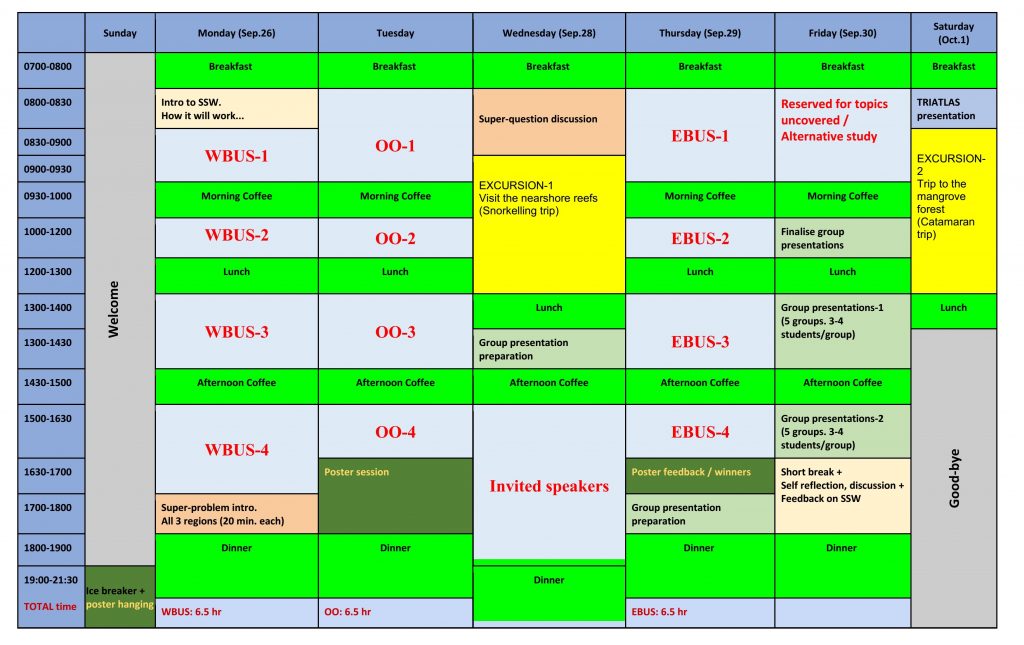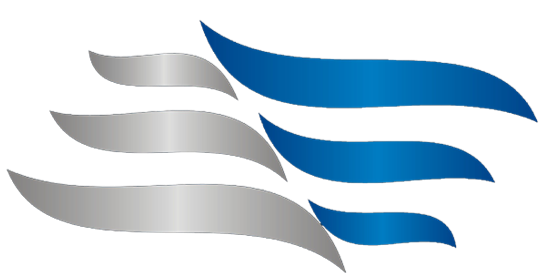Format: In-person*. A combination of lectures, hands-on work, and presentations.
* some content may be delivered on-line, however, in-person participation is strongly encouraged.
The summer school will consist of lectures outlining the “from physics to top predators and fisheries” approach in the three key regions of the Atlantic Ocean. Exercises and group work will stimulate interdisciplinary exchanges among students and lecturers. Group presentations and discussions to identify commonalities and differences in the three key regions will conclude the summer school. Students will also have an opportunity to learn about local ecosystems in Tamandaré through two half-day field trips.
Bring your own mug.
Below is our tentative schedule!

Detailed SSW program
OO-1: “Tropical Ocean Dynamics related to equatorial upwelling and oxygen minimum zones” by Peter Brandt
OO-2: “Phytoplankton and primary production in the Tropical Atlantic – who, how much, where and why” by Ajit Subramaniam
OO-3: “The unfished target: Structure and Composition of mesopelagic fauna” by Heino Fock
OO-4: Tentative topics to be discussed:
-
- Size matters: Scaling of processes and implications for climate change (senses, temperature, oxygen)
- Practical Session: Clines and latitudinal gradients – diversity
- Practical Session: Use physical and biogeochemical data from shipboard, moored, buoy measurements and remote sensing
“Ecosystem functioning and ecosystem-based management -lessons from the Benguela” by Lynne Shannon (45 mins, online)
“Understanding the ‘social’ in social-ecological: progress made in the southern Benguela, South Africa” by Louise Gammage (45 mins, online)
“Introduction to oceanography of Eastern Boundary Upwelling Systems, with a Benguela flavour” by Marie-Lou Bachelery (45 min, in person)
“Coastal climate change and Variability in the Benguela Current System” by Serge Tomety (45 min, in person)
Afternoon Practical Session: Title to be confirmed. by Marie-Lou Bachelery and Serge Tomety (2 hours, in person)
Morning lectures: “The Northern boundary current system: how the thermohaline structure modulates the system from physics to seabirds”
Setting the scene by Arnaud Bertrand (15 min, in person)
Biophysical scenarios by Arnaud Bertrand (15 min, in person)
Response of planktonic organisms by Ralf Schwamborn (30 min, in person)
Response of mesopelagic species by Leandro N. Eduardo (30 min, in person)
Response of top predators by Sophie Lanco-Bertrand (25 min, online)
Synthesis by Arnaud Bertrand (15 min, in person)
Afternoon lectures:
“The Southern boundary current system: how the climate change impacts the atmospheric circulation, ocean, and fisheries” by Barbara Franco (1:15, in person)
-
- Setting the scene: climate change and WBCs warming (20 min, in person)
- Response of marine fisheries (30 min, in person)
- Response of sandy beach species (10 min, in person)
- Key Messages (5 min, in person)
- Future Questions (10 min, in person)
Afternoon Practical Session: Western boundary system in a changing climate: consequences for the ecosystem by Ralf Schwamborn, Leandro N. Eduardo, Barbara Franco, Arnaud Bertrand (2:00, in person)
Invited speakers:
Dr. Jeffrey C. Drazen
Professor
Department of Oceanography
University of Hawaii at Manoa
Dr. Noel Keenlyside
Professor
Geophysical Institute
University of Bergen
Ajit Subramaniam – “Phytoplankton and primary production in the Tropical Atlantic – who, how much, where and why?”
Bárbara Franco – “The Southern boundary current system: how the Climate Change impacts the atmospheric circulation, ocean, and fisheries (SW South Atlantic Ocean)“
Heino Fock – “Size matters: Scaling of processes and implications for climate change (adaptations, senses, temperature, oxygen)“
– “The unfished target: Structure and Composition of mesopelagic fauna”
Peter Brandt – “Tropical Ocean Dynamics related to equatorial upwelling and oxygen minimum zones”
WBUS Morning lectures – “The Northern boundary current system: how the thermohaline structure modulates the system from physics to seabirds“
